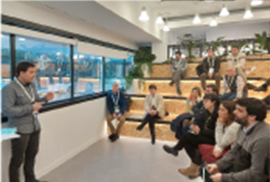Proyecto SECOVE: SUSTAINABLE ENERGY CENTRES OF VOCATIONAL EXCELLENCE
Collaboration between the Politekniko Txorierri Vocational Training Centre, the company Ondoan and the GAIA Cluster to promote sustainable energy.
What is the aim of this collaboration and how far has it progressed?
From the point of view of this triple helix, we have seen the need to organise a structured dialogue at regional level to identify local and regional needs and expectations linked to sustainable energy and to develop a local vision to address them. Thus, on 7 February at Iberdrola's "Global Smart Grids Innovation Hub-GSGIH", a workshop was held with the participation of the main agents linked to the energy sector, such as:
Vocational Training Providers in Bizkaia/Basque Country (regional level)
Regional associations/chambers
Regional group
Companies (both local SMEs and multinationals)
Non-governmental organisations

Two questions were addressed through the workshop:
1.- What does excellence in VET mean by linking it to sustainable energy, and specifically, in the fields of AI, IoT and Cybersecurity; and how can SECOVE contribute to it?
That is, through this question we tried to answer questions such as:
How to be able to establish collaborative networks and VET-company alliances / How to be able to create synergies between industry representatives and VET centres.
How to contribute to excellence in teaching and learning in the sustainable energy sector in the field of cybersecurity, AI and IoT
How to contribute to management and financing
2.- The needs of companies in terms of qualified personnel and how VET centres can respond to these needs.
Regarding this other issue, it was proposed to analyse:
How to identify and involve local stakeholders.
What are the current needs of the sustainable energy labour market in cybersecurity, AI and IoT?
How to create skills ecosystems
How to attract women to VET and attract talent
At the end of the workshop and after analysing these questions, the following conclusions were drawn:
There are already internships for VET students in companies, but sometimes the coordination can be improved.
The relationship can be improved through the Ethazi (challenge-based) challenges designed and developed in collaboration with the company.
More consideration should be given to the internal training given to the trainee in the company, it may be interesting to advance some of this training in the school.
There is a state law that tries to introduce digital transformation in educational curricula (40 hours) but it seems to us that it is insufficient. More specialization should be sought.
We should work on these topics (cybersecurity, AI, IOT...) in the Ethazi challenges.
Fundae and Hobetuz can give clues of which are the most demanded courses and competences, to then introduce them in the cycles adapting the level to the students and the type of challenge
Women may have a self-perception that does not facilitate access to these technical cycles (will I be able to? will I like it? Etc.).
They may lack role models (women working in industrial sectors) and knowledge of these professional profiles.
They may be interested in other topics: social, environmental...
Organizing more events such as this workshop, which gives the opportunity to meet, involve and contact both vocational training centers and companies.
On the part of the administrations, establishing and defining strategic lines linked to solving needs on the part of companies in terms of qualified personnel, in general, and seeking these solutions with the support of vocational training centers. In relation to the needs, the following are indicated: o Knowledge in data center management and data analysis. How to perform secure data exchanges and connected to the cloud.
Need for profiles with technical support, mainly to address industrial projects.
Knowledge in connectivity issues
The first thing to know is what companies need and to know them well.
Also, in order to address the current needs of the labor market, in general terms, linked to enabling technologies, courses of specialization in cybersecurity, AI and IoT could be organized and taught. Also, adapting them to the different profiles that companies may have and trying to make the courses theoretical-practical.
Also, it is of interest to provide data for others to develop applications that companies would use to be more competitive.
The framework of Erasmus projects allows the creation of competence ecosystems where knowledge can be shared and shared content can be developed to work on digital competences in specific thematic areas (energy, smart cities, industry, etc.). In addition, it also allows to create the necessary frameworks of trust to develop stable strategic alliances over time.
The framework of Erasmus projects allows the creation of competence ecosystems where knowledge can be shared and shared content can be developed to work on digital competences in specific thematic areas (energy, smart cities, industry, etc.). In addition, it also allows to create the necessary frameworks of trust to develop stable strategic alliances over time.
Raising awareness of women leaders in the STEM field over the years.
Bringing girls closer to technical schools so that they learn what STEM is and how it works.
Show what companies are doing in this regard, as in the case of Iberdrola, which is trying to teach STEM to the youngest, using the concept of "Ultra-youth".

